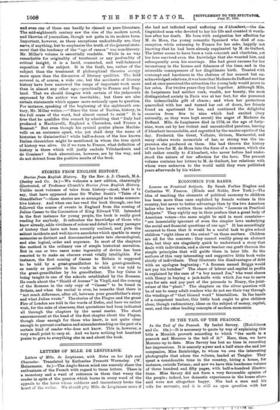STORIES FROM ENGLISH HISTORY.
Stories from English History. By the Rev. A. J. Church, M.A. (Seeley and Co. 5s.)—We welcome a new edition, charmingly illustrated, of Professor Church's Stories from English History. Unlike most volumes of tales from history—most, that is to say, that have appeared since Sir Walter Scott's "Tales of a Grandfather "—these stories are so arranged as to make consecu- tive history. And when one has read the book through, one has followed the course of events in England from the coming of Julius Caesar to the Coronation of King Edward VII. Intended in the first instance for young people, the book is really good reading for anybody. It refreshes the knowledge of those who know already, adds vividness of colour and detail to many passages of history that have not been recently realised, and puts the salient incidents and well-known anecdotes which sparkle in many memories as distinct and disconnected points into chronological, and also logical, order and sequence. In most of the chapters the method is the ordinary one of simple historical narration. But in one or two cases some ingenuity of device has been resorted to to make an obscure event vitally intelligible. For instance, the first coming of Caesar to Britain is supposed to be told by a great-grandfather to his great-grandson, as nearly as possible in the words in which it was told to the great-grandfather by his grandfather. The boy Caius is being taught in one of the schools established by the Romans. He reads about the " Shield of Aeneas " in Virgil, and the coming of the Romans in the only copy of " Caesar" to be found in Britain, and when the recital is over, he remarks that there is "net much difference, after all, between your grandfather's story and what Julius wrote." The stories of the Plague and the great Fire of London are told in the words of Defoe, and here we rather wish, for the sake of clearness, that quotations had been indicated all through the chapters by the usual marks. The short announcement at the head of the first chapter about the Plague, though clear enough for those who know, is not quite clear enough to prevent confusion and misunderstanding on the part of a certain kind of reader who does not know. This is, however, a very small point to carp at. And we have nothing but heartiest praise to give to everything else in and about the book.






















































 Previous page
Previous page